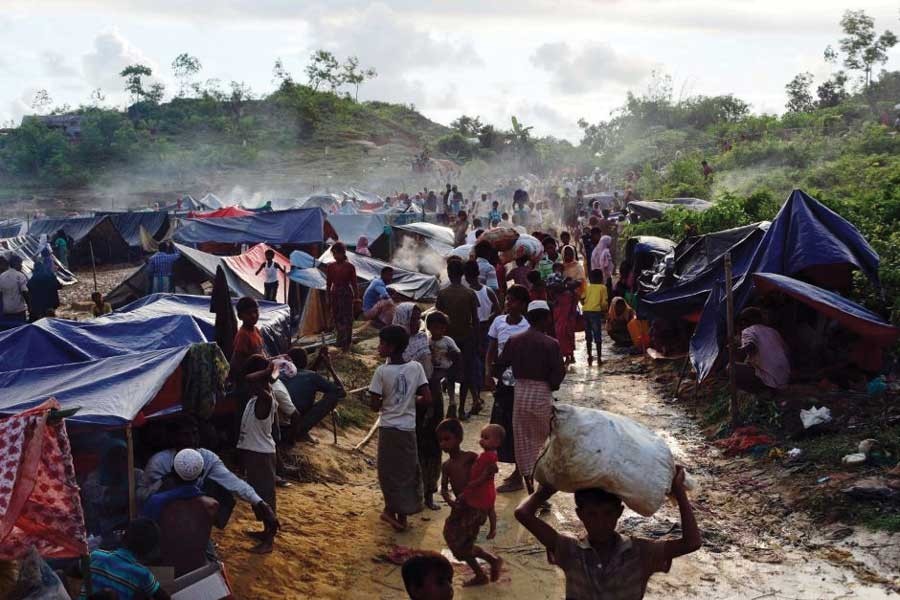Regional security under threat: Shahriar
6th anniversary of Rohingya influx: Delay in repatriation triggers security threat
Int’l bodies hindering repatriation process: Momen; Regional security under threat: Shahriar

Published :
Updated :

Apprehensions over the rise in terrorist activities and tensions between the host community and Rohingya refugees loom large, as Rohingya influx into Bangladesh enters its seventh year on Friday.
On August 25 in 2017, mass exodus of Rohingyas into Bangladesh started and within a year nearly one million of them took shelter in Cox’s Bazar district in the face of brutal ethnic cleansing carried out by the Myanmar security forces.
Top brass of the government have attributed the delay in repatriation of Rohingyas to the ‘lack of sincerity from the Mayanmar side’.
According to Foreign Minister Dr AK Abdul Momen, some international organisations have recently been hindering the repatriation process as they are in favour of the integration of Rohingyas into Bangladesh society.
Commenting on the latest situation, State Minister for foreign Affairs M Shahriar Alam said gun-running and drug-trafficking incidents have increased in the camps, with members of the law enforcement agencies being killed and injured.
As predicted earlier, the delay in repatriation is emerging as a security threat to the entire region, he added.
Due to the delay, several terrorist groups, including the Arakan Rohingya Salvation Army (ARSA), are expanding their activities in the Rohingya camps.
According to a report of the defence ministry, infighting among 11 criminal groups inside the camps is worsening the situation, as all of them want to control drug trafficking, extortion, and human trafficking business in the camps.
The report, submitted to the parliamentary standing committee on defence ministry, made it clear that the presence of ARSA and their suspicious activities are creating security risks.
At present, the number of registered Rohingyas in the 33 camps in Ukhiya and Teknaf upazila of Cox’s Bazar is 1.2 million. According to the report, another terrorist group named the Rohingya Solidarity Organisation (RSO) is active in Ukhiya and Palongkhali camps.
Officials of the Refugee, Relief and Repatriation Commissioner (RRRC) also admitted that several armed groups have been active in the camps.
The Ministry of Defence report said some 22 people were killed in the Rohingya camps in 2021, and in 2022 it increased to 42.
According to another report, between August 2017 and May 2023, at least 125 murder cases, 92 abduction cases, 427 arms cases, and 1,185 drug-related cases were filed with local police stations in Cox’s Bazar, while 4,755 people were prosecuted between 2020 and May 2023.
As the Kutupalong camp, controlled by the ARSA, is near the zero line of the border, conducting regular patrol and surveillance there is tough, the report said, adding that some camps have turned into a hub for conducting the organisational activities and training of ARSA.
Commenting on the issue, RRRC chief Mizanur Rahman said the delay in repatriation of the Rohingyas to their homeland in the Rakhine state of Myanmar has resulted in the surge of terrorism.
Talking to the FE, Foreign Minister Dr AK Abdul Momen recently said some foreign governments and international organisations are against the repatriation as they think that the situation in Rakhine is not conducive.
“They suggested we provide them with vocational training so that they can be engaged in income-generating activities here. But we said that we do not want them to stay here as we are already burdened with a huge population,” Dr Momen said.
About the Chinese effort to facilitate the repatriation, he said that Chinese Special Envoy for Asian Affairs Deng Xijun recently came to Dhaka to discuss the Rohingya issue only.
Meanwhile, tension between the host community and the Rohingyas has risen and the number of conflicts between them is also on the rise.
There has been a growing sense of local people holding refugees responsible for inflation and the impact on their jobs, officials said, adding that the daily wages have come down by 50 per cent since 2017.
According to reports, before the arrival of new refugees in the Cox's Bazar area of Chattogram district, agricultural wages were Tk 500 to Tk 600 (US$ 5 to 6), construction sector wages were Tk 600-Tk 700 (US$ 6 to 7), which has now come down to Tk 200-Tk 250 (US$ 2 to 2.6) per day.


 For all latest news, follow The Financial Express Google News channel.
For all latest news, follow The Financial Express Google News channel.